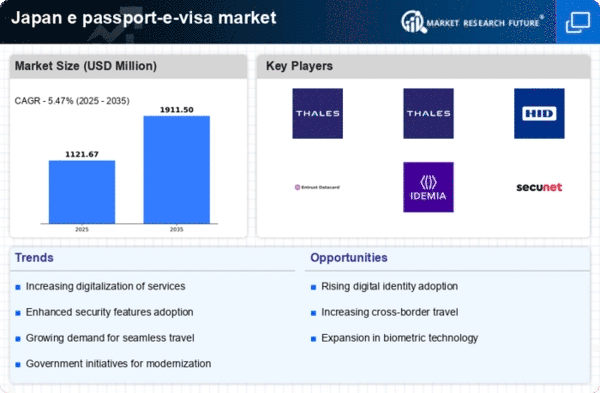Increased International Collaboration
International collaboration is emerging as a key driver for the e passport-e-visa market in Japan. As countries work together to establish standardized protocols for e passports and e visas, the ease of travel is expected to improve. Japan's participation in international agreements and partnerships is likely to facilitate smoother border crossings and enhance the overall travel experience. In 2025, the market may see a growth rate of around 10% due to these collaborative efforts. The e passport-e-visa market stands to gain from the harmonization of regulations and practices, which could lead to increased adoption among travelers.
Rising Demand for Secure Travel Solutions
The e passport-e-visa market in Japan is experiencing a notable surge in demand for secure travel solutions. As international travel resumes, travelers are increasingly concerned about the safety and security of their personal information. The Japanese government has recognized this trend and is actively promoting the adoption of e passports and e visas to enhance security measures. In 2025, it is estimated that the market will grow by approximately 15%, driven by the need for advanced security features such as biometric data and encryption. This shift towards secure travel solutions is likely to bolster the e passport-e-visa market, as travelers seek assurance that their data is protected during their journeys.
Government Support for Digital Infrastructure
Government support for digital infrastructure is a significant driver of the e passport-e-visa market in Japan. The Japanese government is investing heavily in enhancing its digital infrastructure to support the implementation of e passports and e visas. This investment is aimed at improving the efficiency of border control processes and ensuring that the necessary technology is in place to support these digital solutions. In 2025, it is anticipated that the market will grow by around 11% as a result of these initiatives. The e passport-e-visa market is poised to benefit from this government backing, which is likely to facilitate a smoother transition to digital travel solutions.
Growing Awareness of Digital Identity Solutions
The growing awareness of digital identity solutions is influencing the e passport-e-visa market in Japan. As individuals become more familiar with the benefits of digital identities, there is a rising expectation for seamless and secure travel experiences. The Japanese government is actively promoting digital identity initiatives, which are expected to drive the adoption of e passports and e visas. By 2025, the market could witness a growth of approximately 14%, as more travelers opt for digital solutions that simplify the application and verification processes. The e passport-e-visa market is likely to thrive as awareness continues to expand.
Technological Advancements in Document Verification
Technological advancements play a crucial role in shaping the e passport-e-visa market in Japan. Innovations in document verification technologies, such as optical character recognition (OCR) and machine learning algorithms, are enhancing the efficiency and accuracy of processing e passports and e visas. These advancements are expected to reduce processing times significantly, making travel more convenient for users. In 2025, the market is projected to expand by 12% as these technologies become more integrated into the travel process. The e passport-e-visa market is likely to benefit from these improvements, as they streamline operations and enhance user satisfaction.
















